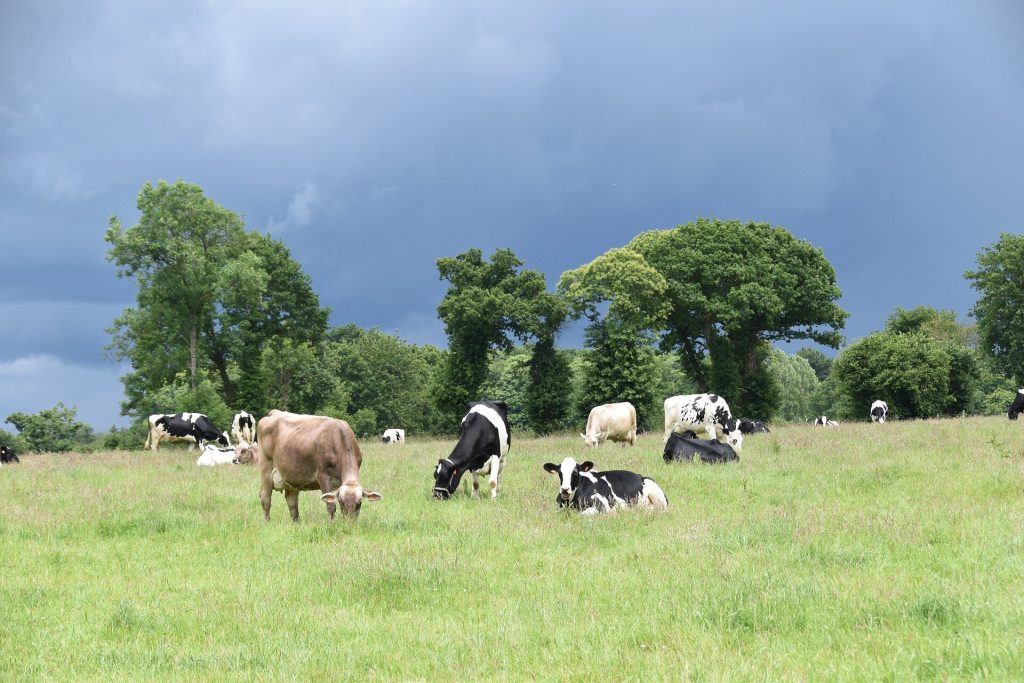Credit: CC0 Public Domain
A study published in Genome Biology This opens up new possibilities for improving production efficiency in the cattle industry, and in animal agriculture in general. A team of researchers from Baylor College of Medicine, Cornell University, and the United States Department of Agriculture discovered that CoRSIV is present in cattle, just as it is in humans.
CoRSIV is a genomic region with chemical markers on its DNA that provide information that allows dairy farmers to predict and select desirable cow traits, such as milk production, female fertility and disease resistance.
“Most people know that each person has a unique set of genes, or genome, but what many people don’t know is that the expression of those genes is controlled by a system of molecular markings on DNA, called epigenetics, that tells different cells in the body which genes to turn on or off,” said co-corresponding author Robert A. Waterland, PhD, professor of pediatric nutrition in the USDA/ARS Child Nutrition Research Center at Baylor University.
“We focus on DNA methylation – the addition of methyl groups, which is the most stable epigenetic mark. Differences in DNA methylation in different people can affect disease risk.”
in 2019Waterland and his colleagues discovered that the human genome contains a special region called CoRSIV – a correlated region of systematic inter-individual variation.
CoRSIV DNA methylation levels vary from person to person but are consistent across different tissues within each individual, meaning that CoRSIV methylation can be measured in easily accessible tissues such as blood, providing information about epigenetic regulation in internal organs such as the brain, ovaries, and liver.
Their previous work reported that there are approximately 10,000 CoRSIV copies in the human genome and proposed that studying these new regions is a powerful way to uncover the epigenetic causes of disease. CoRSIV is already associated with diverse health outcomes Cancer, thyroid function, cognitive function, type 2 diabetes, etc. Cleft palateschizophrenia, childhood obesity, and autism spectrum disorder.
In the current study, the researchers investigated whether CoRSIV is also present in cattle. They analyzed whole-genome DNA methylation sequencing data from multiple tissues from two Holstein cows.
“The algorithm we developed showed that cows do indeed harbor CoRSIV,” said first author Wenzhou Zhang, a bioinformatics analyst in the Waterland lab. “What’s even more exciting is that it showed that the bovine CoRSIV shares significant characteristics with the human one, suggesting that CoRSIV is likely present in other mammals as well. The race is on to find CoRSIV in other species, such as horses and pigs.”
“To confirm some of the CoRSIVs that Wen Zhou identified, we performed laboratory analysis of liver, kidney, brain and blood tissue from 20 Holstein calves to validate our computational findings,” said Waterland, of Baylor University’s Dan L. Duncan Comprehensive Cancer Center. “This independent validation has added great strength to our work.”
“In recent decades, livestock farming has focused on genetic selection to achieve significant improvements in milk production. CoRSIV may offer a new approach to improve the selection of desirable traits for the livestock industry in a sustainable way that reduces costs and environmental impacts,” said Yi Athena Ren, PhD, assistant professor in the Department of Animal Sciences at Cornell University and co-corresponding author.
“Bovine CoRSIV, like human CoRSIV, becomes established early in life and remains stable throughout an individual’s life,” Waterland said.
“In newborn cows, methylation patterns across a subset of CoRSIVs may be predictive of future performance. These may be associated with certain desirable traits, such as abundant milk production, high female fertility, disease resistance and even heat tolerance, helping to select individual calves with traits that will lead to increased productivity.”
The researchers found that, similar to humans, the establishment of DNA methylation in bovine CoRSIV is influenced by the early embryonic environment.
“This suggests that tailoring embryo culture conditions during assisted reproductive techniques may provide an opportunity to customize agricultural outcomes through epigenetic engineering,” Ren said.
“In addition to aiding in the selection of desirable traits, CoRSIV can help us understand disease processes and individual differences in cattle. And if, as we anticipate, CoRSIV is a general feature of mammalian genomes, the agricultural opportunities could be enormous.” Cow“
For more information:
Inter-individual DNA methylation variation in cattle shares significant features with that in humans. Genome Biology (2024). DOI: 10.1186/s13059-024-03307-6
Provided by
Baylor College of Medicine
Quote: Big boost for new epigenetics paradigm: CoRSIV first found in humans now found in cows (July 14, 2024) Retrieved July 15, 2024 from https://phys.org/news/2024-07-big-boost-epigenetics-paradigm-corsivs.html
This document is subject to copyright. It may not be reproduced without written permission, except for fair dealing for the purposes of personal study or research. The content is provided for informational purposes only.


